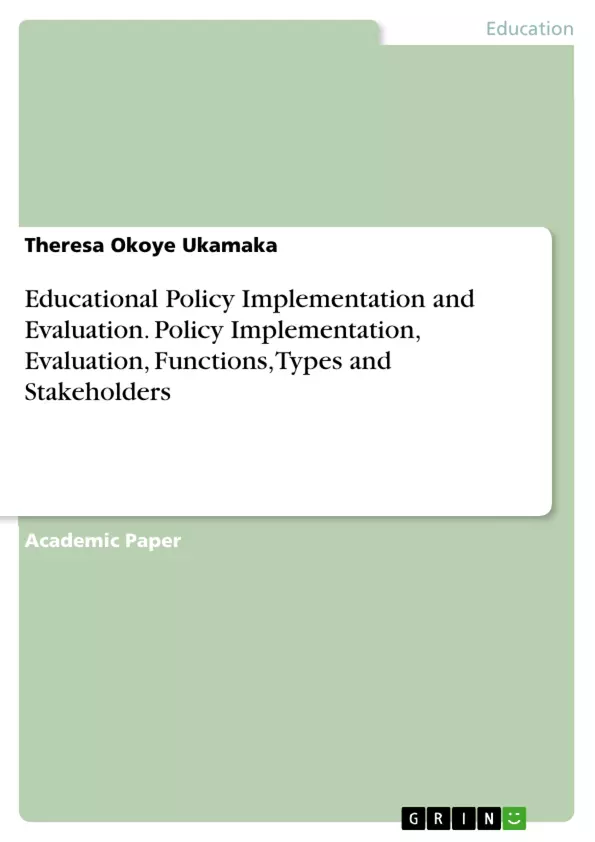Policies are implemented by governments and other organisations in the form of laws, regulations, procedures, administrative actions, incentives, and voluntary activities. Policy essentially directs behaviours towards those that are most likely to produce the intended result. Policies are rules, principles, guidelines, or frameworks that an organisation adopts or designs to achieve long-term goals. Policy formulation is a step in the process of making public policies in which governments and other policy players seek and answer questions about how societies can deal with various types of challenges and conditions that affect citizens and organisations in their pursuit of their objectives. Whatever solutions arise from formulation activity serve as the foundation for what, ultimately implemented, becomes public policy. Educational policy is concerned with the formation of a decision, its implementation, and evaluation. Policies are written or unwritten declarations that guide managers' present and future thinking, projects, actions, and decisions. They are written when there are documents available for reference and are unwritten when they are issued in the form of pronouncements, which are policy statements made by people in positions of power or authority. Stakeholders in policymaking are individuals who care about or are somehow influenced by the policy; they also include those active in policy creation. They are the ones who are interested about the advancement and well-being of the educational sector. Policy stakeholders include public interest groups, business associations, trade unions, academics, media, international non-governmental organisations, professional governmental policy analysts, commissions, committees and task forces, research councils/scientists and so on. Public policies are of different types, including: regulatory, industrial, redistrutive, constituent policies and so on. This book gives more on the fuctions of public policies, implemention and evaluation of public policies and others.
Inhaltsverzeichnis (Table of Contents)
- Introduction
- DEFINITION/MEANING OF POLICY
- FUNCTIONS OF POLICIES
- FUNCTIONS OF EDUCATIONAL POLICIES
- STAKEHOLDERS IN POLICY PLANNING
- .TYPES OF POLICY
- POLICY IMPLEMENTATION
- NEED FOR POLICY IMPLEMENTATION
- BARRIERS TO POLICY IMPLEMENTATION
- POLICY EVALUATION
- Types of Policy Evaluation
- CRITERIA FOR EDUCATIONAL POLICY EVALUATION
- PROCEDURE FOR POLICY EVALUATION
- STRATEGIES FOR POLICY EVALUATION
- MERITS OF POLICY EVALUATION
- BARRIERS TO EFFECTIVE POLICY EVALUATION
- CONCLUSION
Zielsetzung und Themenschwerpunkte (Objectives and Key Themes)
This text aims to explore the concept of educational policy, its implementation, and evaluation. It provides a comprehensive overview of the various aspects involved in developing, executing, and assessing educational policies.
- Definition and Meaning of Policy
- Functions of Educational Policies
- Barriers to Policy Implementation
- Types and Criteria for Policy Evaluation
- Merits and Barriers to Effective Policy Evaluation
Zusammenfassung der Kapitel (Chapter Summaries)
The introductory chapter defines the concept of policy and its role in guiding organizational goals. It explores the various functions of educational policies and the key stakeholders involved in their planning.
The chapter on policy implementation examines the need for effective implementation, highlighting the challenges and barriers that often arise. This section delves into specific issues such as inadequate infrastructure, problems of continuity, and institutional corruption.
The text then focuses on policy evaluation, discussing the different types of evaluation, including process, outcome, impact, and cost-benefit analysis. It further explores the key criteria for evaluating educational policies, such as relevance, coherence, effectiveness, efficiency, impact, and sustainability.
The final chapters delve into the procedures and strategies involved in policy evaluation, highlighting the merits of this process. The text concludes by discussing the barriers to effective policy evaluation, providing insights into potential limitations and challenges.
Schlüsselwörter (Keywords)
Educational policy, policy implementation, policy evaluation, barriers to implementation, criteria for evaluation, process evaluation, outcome evaluation, impact evaluation, cost-benefit analysis, merits of evaluation, barriers to effective evaluation.
- Quote paper
- Theresa Okoye Ukamaka (Author), 2024, Educational Policy Implementation and Evaluation. Policy Implementation, Evaluation, Functions, Types and Stakeholders, Munich, GRIN Verlag, https://www.hausarbeiten.de/document/1485743


